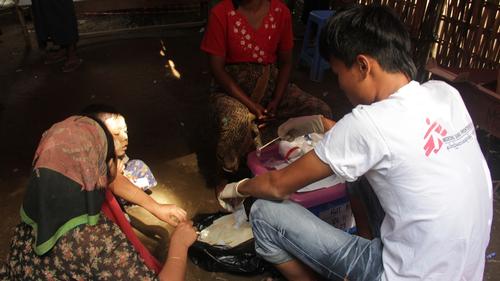Tens of thousands of people in Myanmar’s Rakhine state are able to access basic healthcare and emergency referral from medical humanitarian organisation Médecins Sans Frontières (MSF) for the first time in over nine months. Following instructions to MSF to stop last February, these primary health clinics restarted on 17th December 2014.
MSF has worked in Rakhine state since 1992 to provide basic healthcare, reproductive care, emergency referrals, and tuberculosis and HIV care. MSF has also treated over 1.2 million malaria patients in the state since 2004. All medical services have been provided based purely on the severity of individuals’ medical need.
“We welcome the progress we have made so far, but stress there is space to do more, space we at MSF are willing and able to fill,” said Martine Flokstra, MSF Myanmar Operational Adviser in Amsterdam. “We hope to continue this dialogue with the authorities to ensure that those who need it most in Rakhine state are able to access the healthcare they need,” Ms. Flokstra added.
Since restarting primary health clinics four weeks ago, MSF has done over 3,480 outpatient consultations, seeing predominately people with watery diarrhoea, respiratory infections, and patients with chronic conditions who used to get the medications they need to manage their disease from MSF Holland before those services were suspended. The organization has also done over 550 consultations with pregnant women in this short period.
Despite being required to suspend activities in Rakhine last February by the authorities, since July 2014 MSF Holland has worked together with the Ministry of Health in Rakhine by providing medicine and personnel to support mobile primary health care teams in Sittwe and Pauktaw Townships, and continued its support of HIV patients in Buthidaung and Maungdaw. Throughout this period MSF also continued to provide direct care and treatment to more than 35,000 HIV/AIDS patients, and more than 3,000 tuberculosis patients, most of whom are also HIV positive, across Myanmar.



